
Stellenbosch Papers in Linguistics Plus-SPiL Plus
Scope & Guideline
Unlocking the Complexity of Language Together
Introduction
Aims and Scopes
- Historical and Sociolinguistic Analysis:
The journal frequently publishes research that traces the historical development of languages, particularly Afrikaans, and examines their sociolinguistic contexts, reflecting on the implications of language evolution and change. - Phonetic and Phonological Studies:
There is a consistent focus on phonetic and phonological research, with investigations into sound patterns, vowel quality, and consonant shifts across various languages, showcasing the journal's dedication to empirical linguistic methodologies. - Syntax and Construction Grammar:
SPiL Plus includes studies that delve into syntax, particularly the intersection of syntax with other linguistic domains like poetry and construction grammar, highlighting innovative approaches to understanding grammatical structures. - Language Documentation and Preservation:
The journal emphasizes the importance of documenting lesser-studied languages and dialects, contributing to the preservation of linguistic diversity and raising awareness about endangered languages. - Interdisciplinary Approaches:
The inclusion of interdisciplinary research, such as the application of social media in language education, reflects the journal's commitment to exploring the intersection of linguistics with other fields like education and social sciences.
Trending and Emerging
- Sociophonetics and Language Variation:
The journal has seen an increase in studies exploring sociophonetic aspects of language, particularly in relation to South African English and Afrikaans, emphasizing the social dimensions of phonetic variation. - Language and Technology:
Emerging themes include the intersection of language and technology, particularly regarding the use of social media in education and its impact on language learning, highlighting the relevance of modern communication tools in linguistic research. - Language Endangerment and Revitalization:
There is a growing focus on the documentation and revitalization of endangered languages, reflecting a commitment to preserving linguistic diversity and addressing the challenges faced by lesser-known languages. - Cross-Linguistic Typology:
Recent publications show an increased interest in cross-linguistic typology, particularly in the analysis of constructions across different languages, indicating a trend towards comparative studies that enrich our understanding of linguistic universals. - Cognitive and Theoretical Linguistics:
The journal is beginning to incorporate more theoretical frameworks that intersect with cognitive linguistics, exploring how cognitive processes influence language structure and use, which may signal a broader shift in theoretical approaches.
Declining or Waning
- Serial Verb Constructions:
While serial verb constructions were a significant focus in earlier publications, recent issues show a decrease in studies dedicated specifically to this topic, suggesting a potential waning interest or a shift towards other syntactic phenomena. - Traditional Morphological Studies:
There has been a noticeable reduction in the publication of papers centered on traditional morphological analysis, indicating a possible trend towards more innovative and applied linguistic research rather than conventional morphological frameworks. - Descriptive Studies of Specific Languages:
The journal seems to be publishing fewer papers that focus solely on descriptive studies of specific languages, which may reflect a broader trend towards comparative and theoretical analyses rather than isolated language studies.
Similar Journals

REVUE DE LINGUISTIQUE ROMANE
Advancing Knowledge in Linguistic HeritageREVUE DE LINGUISTIQUE ROMANE, published by the esteemed SOCIÉTÉ LINGUISTIQUE ROMANE, is a prominent academic journal dedicated to the exploration of Romance linguistics. With its ISSN 0035-1458, the journal plays a significant role in advancing knowledge within the fields of linguistics and the history and philosophy of science. Although it does not currently offer Open Access, it provides critical insights and peer-reviewed research that are indispensable for scholars, educators, and students interested in the nuances of Romance languages. The journal, which has seen converged coverage from 2006 to 2017, and then again from 2019 to 2021, is ranked in the third quartile (Q3) across various categories within Scopus, reflecting its established presence in the academic community. As a vital resource for interdisciplinary studies, REVUE DE LINGUISTIQUE ROMANE is instrumental for those seeking to deepen their understanding of linguistic structures, cultural nuances, and the historical development of Romance languages.

Yuyan Kexue-Linguistic Sciences
Bridging Theoretical and Applied Linguistics for Global ImpactYuyan Kexue-Linguistic Sciences, published by SCIENCE PRESS, is a pivotal academic journal dedicated to the field of linguistics. With its ISSN of 1671-9484, this journal seeks to explore and illuminate various linguistic phenomena, contributing significantly to the understanding of language in both theoretical and applied contexts. Emphasizing interdisciplinary research, it welcomes contributions that bridge linguistics with areas such as cognitive science, sociology, and communication studies. Although it currently does not offer open access, Yuyan Kexue-Linguistic Sciences aims to provide a platform for researchers, professionals, and students alike to engage with cutting-edge studies and emerging trends in linguistics. Its publication location in Beijing positions it as a vital contributor to the global discourse in the linguistic sciences, catering to both a national and international audience. As the journal continues to grow, it aspires to maintain high academic standards and foster scholarly exchange for years to come.
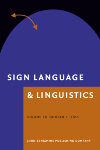
Sign Language & Linguistics
Fostering Scholarly Dialogue in Sign LinguisticsSign Language & Linguistics is an esteemed academic journal published by John Benjamins Publishing Co, dedicated to advancing the field of sign language studies and linguistics. With an ISSN of 1387-9316 and an E-ISSN of 1569-996X, this journal has earned a prominent place in the linguistic community, achieving a Q1 ranking in both the Linguistics and Language category, and standing out within the Scopus rankings, placing in the 77th percentile among the Arts and Humanities and 75th percentile in the Social Sciences categories. Sign Language & Linguistics spans over two decades of research, offering comprehensive insights and analyses from 1998 to 2024, promoting high-quality scholarly communication. Aimed at researchers, professionals, and students alike, this journal is essential for those exploring the intersection of sign languages, linguistics, and cultural studies, facilitating progressive discourse and fostering an understanding of this vital mode of human communication.
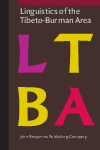
Linguistics of the Tibeto-Burman Area
Connecting Cultures Through Tibeto-Burman Language ScholarshipLinguistics of the Tibeto-Burman Area is a premier journal dedicated to the study and exploration of the Tibeto-Burman languages, offering a significant platform for researchers, scholars, and practitioners in the field of linguistics. Published by John Benjamins Publishing Co, this journal not only maintains rigorous scholarly standards but also aims to contribute to the understanding of language diversity and evolution within the Tibeto-Burman region. With an impressive Q2 ranking in linguistics and language, it ranks in the 49th percentile within Arts and Humanities and the 45th percentile in Social Sciences, highlighting its relevance and quality in the academic community. Since its inception in 2011, the journal has been at the forefront of disseminating research that encourages interdisciplinary dialogue and fosters insights into language structure, use, and cultural implications. Though not an open access publication, it remains accessible to institutions and individuals alike, ensuring that vital academic discussions continue. The ISSN for print is 0731-3500 and for the electronic version, 2214-5907, facilitating the work of the growing scholarly community engaged in Tibeto-Burman linguistics.

Jezikoslovlje
Advancing Language Studies for the Modern ScholarJezikoslovlje, published by the Josip Juraj Strossmayer University, Faculty of Philosophy in Croatia, is an essential publication in the field of Linguistics and Language Studies. Launched in 2008 and extending its contributions to the academic community through 2024, this journal addresses a spectrum of linguistic research, facilitating scholarly dialogue around both theoretical and applied aspects of language. With a current Scopus ranking placing it in the 54th percentile in the Arts and Humanities and the 50th percentile in Social Sciences, Jezikoslovlje serves as a vital resource for researchers and students looking to engage with contemporary linguistic issues. Although it operates under a traditional access model, its indexed presence and rigorous peer-review process ensure that published works maintain a high scholarly standard, inviting contributions that advance understanding in this dynamic discipline. The journal's commitment to fostering knowledge in linguistics makes it a significant platform for academics in Croatia and beyond.
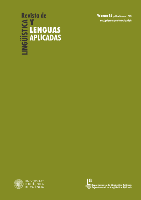
Revista de Linguistica y Lenguas Aplicadas
Innovative Insights for the Linguistic CommunityRevista de Linguistica y Lenguas Aplicadas, an esteemed journal published by UNIV POLITECNICA VALENCIA, EDITORIAL UPV, is a pivotal resource in the field of linguistics and applied languages. Since its inception, the journal has embraced Open Access publishing since 2006, ensuring that its rich repository of research is readily available to a global audience of researchers, academics, and language professionals. Headquartered in Valencia, Spain, the journal contributes significantly to the advancement of linguistics knowledge, boasting a respectable ranking within the Q3 quartile for Linguistics and Language (2023) according to Scopus metrics. It covers a diverse range of topics and methodologies, engaging readers through its commitment to scholarly rigor and innovation. The journal is uniquely positioned to inform and inspire essential discussions from 2015 to 2024, making it a vital platform for emerging linguists and seasoned scholars alike, as they explore the evolving landscapes of language and communication.
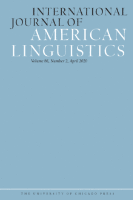
INTERNATIONAL JOURNAL OF AMERICAN LINGUISTICS
Elevating Scholarship in American Linguistic Studies.The INTERNATIONAL JOURNAL OF AMERICAN LINGUISTICS, published by University of Chicago Press, is a revered scholarly publication dedicated to the exploration and advancement of linguistic studies, particularly those related to the American linguistic landscape. With an ISSN of 0020-7071 and an E-ISSN of 1545-7001, this journal serves as a vital platform for researchers, professionals, and students interested in the nuances of language, dialects, and linguistic structures through rigorous academic inquiry. The journal has established a commendable impact, reflected in its ranking within the Q2 category in Linguistics and Language and its placements in the Scopus rankings, thereby positioning itself within the 50th to 53rd percentile of its respective fields. While the journal does not provide Open Access options, it continues to be a cornerstone resource for those seeking to expand their understanding of American linguistics, already converging from 1996 to 2024. Through its continued commitment to excellence, this publication remains essential for those aiming to contribute significantly to the field.

Catalan Journal of Linguistics
Connecting Scholars through Open Access Linguistic Research.Catalan Journal of Linguistics is a distinguished academic publication dedicated to the dynamic field of linguistics and language studies. Published by the Universitat Autònoma de Barcelona, this open-access journal has been disseminating impactful research since 2002, making significant contributions to the understanding of linguistic theory, language acquisition, and sociolinguistics, particularly within the Catalan language context. With a robust engagement in the scholarly community, it proudly holds a Q2 ranking in Linguistics and Language as of 2023, reflecting its commitment to high standards of research and innovation. The journal is accessible to a global audience, promoting the free exchange of knowledge beyond geographical boundaries, and serves as an essential platform for researchers, professionals, and students aiming to stay at the forefront of linguistic inquiry. With its rich archive of articles, the Catalan Journal of Linguistics stands as a vital resource for anyone keen to explore contemporary linguistic issues and advancements.
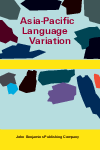
Asia-Pacific Language Variation
Unveiling the Diversity of Language in the Asia-Pacific RegionAsia-Pacific Language Variation is a prominent scholarly journal published by John Benjamins Publishing Co, dedicated to the exploration and analysis of linguistic diversity across the Asia-Pacific region. With its ISSN 2215-1354 and E-ISSN 2215-1362, the journal serves as a key resource for researchers and practitioners in the fields of linguistics and language studies. Since its inception in 2019, it has quickly ascended in stature, receiving a 2023 category quartile ranking of Q2 in Linguistics and Language and achieving impressive Scopus rankings, placing it in the 83rd percentile in Arts and Humanities and 81st in Social Sciences. Through its rigorous peer-reviewed articles, the journal aims to foster a deeper understanding of language variation, promoting interdisciplinary research and collaboration. Although it is not an open-access journal, the depth of research and critical insights offered in its pages make it an invaluable asset for academics, students, and professionals keen on the nuances of language within the dynamic Asia-Pacific context.

Journal of Slavic Linguistics
Navigating the Complexities of Slavic Linguistic StructuresJournal of Slavic Linguistics, published by SLAVICA PUBLISHERS, is a key academic resource dedicated to the exploration of Slavic languages and linguistics. Established to provide a comprehensive platform for scholarly research, this journal addresses the intricate dynamics of Slavic phonetics, syntax, semantics, and discourse, making significant contributions to both theoretical and applied linguistics. The journal holds an impact factor that reflects its value in the linguistic community, particularly as it is ranked in the Q4 category in Linguistics and Language for 2023. With a focus on a wide range of topics within the field, the Journal of Slavic Linguistics serves as an essential reference for researchers, educators, and students alike, fostering an appreciation and deeper understanding of Slavic linguistic phenomena. Although currently not an Open Access journal, it remains accessible to a broad audience keen on engaging with contemporary linguistic scholarship.